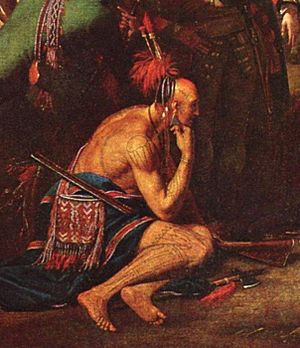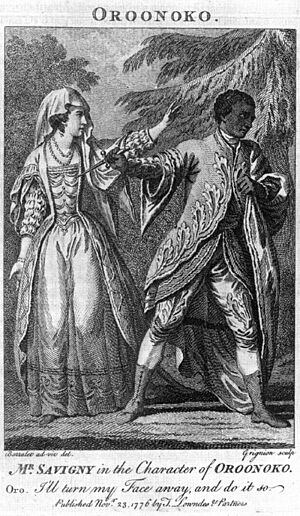Noble savage facts for kids
The term "noble savage" is an idea that suggests humans are naturally good when they live simply, away from civilization. This idea believes that it is civilization that makes people act in bad ways. It became popular in the 17th century and grew in the 18th century. One of the first people to talk about this idea was Shaftesbury. He encouraged writers to look for the simple ways and innocent behavior often found among people living in nature, before they were changed by modern society. This idea was a contrast to the belief in original sin and was supported by other writers like Richard Steele. Steele thought that bad manners in his time came from wrong education.
In the 18th century, people admired the "noble savage" who was not spoiled by civilization. They thought this person was more truly noble than someone trained by society. The exact phrase "noble savage" first appeared in Dryden's play The Conquest of Granada (1672). However, the idea of "nature's gentleman" was part of the sentimentalism of the 18th century.
Contents
Early Ideas of the Noble Savage
During the 17th century, the idea of the "Good Savage" was used to criticize European society. Europe was going through terrible religious wars at the time. For example, the Massacre of Saint Bartholomew in 1572 saw about 20,000 people killed in France. This event shocked many and led Montaigne to write his essay "Of Cannibals" (1587). In it, he pointed out that while some groups might eat each other in rituals, Europeans were even more brutal, burning people alive for different religious beliefs.
The way Spanish Conquistadors treated native peoples also caused many Europeans to feel guilty. Bartolomé de las Casas, who saw these events, might have been one of the first to praise the simple life of the native Americans. He and others said that these people were honest and lived simply.
European guilt about colonialism and using new guns against people who didn't have them inspired stories. One such story was Aphra Behn's novel Oroonoko, or the Royal Slave. It was about a slave revolt in Surinam in the West Indies. Behn wrote the story for money, and it followed popular romance styles of the time. The leader of the revolt, Oroonoko, is shown as truly noble because he is an African prince. He misses his homeland, describing it like a Golden Age. He is not a "savage" but acts and dresses like a European noble. This story was later made into a play by Thomas Southerne. Over time, it became known for discussing slavery and colonialism and was very popular.
Meaning of "Noble Savage"
The phrase "Noble Savage" first appeared in English in Dryden's play The Conquest of Granada (1672). He wrote: "I am as free as nature first made man, / Ere the base laws of servitude began, / When wild in woods the noble savage ran."
However, the term "Noble Savage" only became widely used in the late 1800s. By then, it was often used in a negative way. In French, the term was "Good Savage" (or good "Wild man"). In the 18th century, the word "savage" didn't always mean cruel. It could simply mean "wild," like a wild flower.
The idea of "Nature's Gentleman" was part of the 18th-century focus on feelings and emotions in literature. This figure was like other popular characters, such as the Virtuous Milkmaid or the clever servant (like Sancho Panza or Figaro). These characters showed that good qualities could be found in people of humble beginnings. This idea has been around for a long time. For example, in the ancient Gilgamesh, there is Enkiddu, a wild but good man who lives with animals. Even the shepherd boy David from the Bible fits this idea. The belief that goodness can exist with humble birth is a long-held idea in Abrahamic religions.
The idea that leaving society, especially cities, is linked to being good also comes from religious beliefs.
Alexander Pope, a very famous poet of his time, wrote about the American Indian in his poem "Essay on Man" (1734):
Lo, the poor Indian! whose untutor'd mind /
Sees God in clouds, or hears him in the wind; / His soul proud Science never taught to stray / Far as the solar walk or milky way; / Yet simple Nature to his hope has giv'n, / Behind the cloud-topp'd hill, a humbler heav'n; / Some safer world in depth of woods embrac'd, / Some happier island in the wat'ry waste, / Where slaves once more their native land behold, / No fiends torment, no Christians thirst for gold! / To be, contents his natural desire; / He asks no angel's wing, no seraph's fire: / But thinks, admitted to that equal sky, /
His faithful dog shall bear him company.
Pope's poem shows a common belief of the Age of Reason. This belief was that people are the same everywhere and at all times. Pope shows his Indian as a victim ("the poor Indian"). Even though the Indian is less educated and has fewer big goals than Europeans, he is just as good, or even better. This means he is equally worthy of being saved. He is a "bon sauvage" (good savage), but not necessarily a "noble" one in the later sense.
Qualities of Romantic Primitivism
People who believed in "Romantic Primitivism" often thought that the "noble savage" had these qualities:
- Living in harmony with Nature
- Being generous and selfless
- Having innocence
- Being unable to lie; being loyal
- Having good physical health
- Not caring about fancy things
- Having moral courage
- Having "natural" intelligence or wisdom without formal schooling
These qualities were also used by the Roman writer Tacitus in the first century CE. In his book Germania, he described the German "barbarians." He compared them to the softer, more Romanized Gauls. Tacitus used this comparison to criticize his own Roman culture for moving away from its strong roots. He saw the Germans as tough and able to handle hardship, which he preferred over the "softness" of civilized life.
Other pages
See also
 In Spanish: Buen salvaje para niños
In Spanish: Buen salvaje para niños
 | Bayard Rustin |
 | Jeannette Carter |
 | Jeremiah A. Brown |



